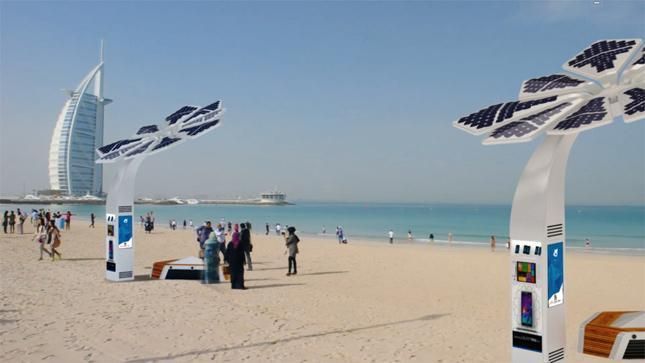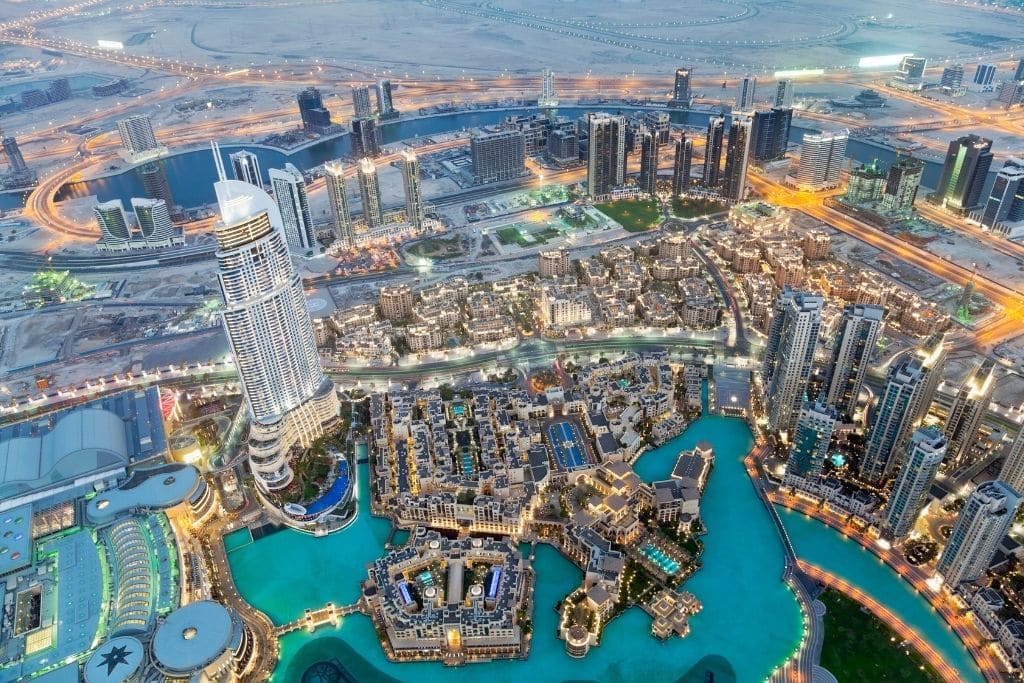From going paperless and cashless to adopting blockchain technology with the goal of becoming the first city in the world to be 100% powered by it, Dubai is taking giant leaps to improve efficiency and quality of life of its citizens. We take a look at some of the leading smart city projects in Dubai addressing its growing population demands and climate change.
—
The capital of the Emirate of Dubai and the most populous city in the United Arab Emirates (UAE), the city of Dubai has undergone a stunning transformation from a small fishing village into one of the wealthiest metropolis in the world in mere decades. Today, the city is known for its towering skyscrapers – including the Burj Khalifa, the world’s tallest building – ports, beaches, and luxury hotels, as well as being home to nearly 3 million people.
But there’s no end in sight for Dubai’s rapid development. To accommodate the city’s expanding population, infrastructure and energy consumption, the government is betting big on smart city projects and technologies with the goal of making Dubai “the happiest city on Earth”.
What are Smart Cities?
Estimates say that nearly 4 billion people are projected to live in cities around the world, of which more than two-thirds will reside in urban environments. Urbanisation will rapidly amplify problems related to waste disposal, traffic pollution, and high energy consumption, which all have detrimental impacts on the environment, not to mention exacerbates the effects of climate change.
The concept of smart cities is to improve energy efficiency, minimise greenhouse gas emissions, become more environmentally-friendly, and to improve the overall quality of life of a city’s citizens. Some of the key features of a smart city is the adoption of data-sharing and collecting smart technologies such as the Internet of Things (IOT) and information communication technologies (ICTs) that could be utilised across sectors spanning from waste disposal and traffic congestion to energy consumption and air pollution as well as contactless payment technology.
Smart City in Dubai
In 2021, the government of Dubai launched the Smart Dubai Strategy, which encompasses over 100 smart initiatives (to be completed by 2028) and 1,000 smart services across the city to enhance government services as well as making it all more accessible. This includes digitisation and automation in police stations – residents can pay fines and report accidents without having to speak to an officer – and injecting resources into clean energy, sustainable (in some cases, driverless) transport and public infrastructure. The city has already started constructing buildings using only 3D printers, for example.
These smart projects all leverage new technologies such as 5G communications, cloud and big data analytics, 3D printing, artificial intelligence (AI), IoT, and blockchain technology. The latter of which is a crucial component to Dubai’s smart city model as they seek to be the first in the world to be powered entirely by blockchain technology.
In adopting blockchain, the city aims to deliver faster connectivity and productivity across all sectors as a way to encourage and secure business and partnerships in the UAE and around the world, not to mention driving its economy further. Data utilisation can also offer more personalised and efficient services for both residents, businesses and tourists – Dubai was the fourth most-visited city in the world in 2018 with tourism being a major source of revenue.
According to the official Smart Dubai Strategy website, “Dubai stands to unlock 5.5 billion dirham (nearly USD$1.5 billion) in savings annually in document processing alone” simply by digitising and adopting blockchain technology. The city has also partnered with IBM for its AI lab to deploy a range of AI services and applications across governmental and private sectors. For instance, AI is being used to monitor the level of fatigue and stress of bus drivers to help minimise the risk and number of accidents on the road.
Another major goal under the Strategy is to turn Dubai into a cashless and paperless city by automating and digitising various aspects of urban life, be it transportation and bill payment or governmental transactions, thereby saving 1,000,000 trees, according to the official figures.

Other notable smart technology being deployed across the city is the solar-powered, 21-foot-tall “Smart Palm” trees, which provides not only shade but also Wi-Fi, and can be used as a charging station and lamp post featuring a security camera and emergency call button. Over a hundred of these are being installed at city beaches and parks.
One of the city’s flagship projects, the Dubai-Abu Dhabi Hyperloop (also known as the Virgin Hyperloop), is also worth noting. The USD$6 billion project will see the construction of a super-fast electric tube system that aims to drastically cut down transportation times, promising to reduce travel times between Dubai and Abu Dhabi from an hour or so down to just mere 12 minutes. The Hyperloop also says it “will have a lower environmental impact than other modes of mass transportation” – though no specifications have been stated – and plans to commercially launch its cargo services by the middle of this decade, expanding the city’s supply chain and business opportunities.
You might also like: Top 7 Smart Cities in the World
Addressing Climate Change
Smart cities aims to reduce environmental burdens in urban areas. As Dubai plans to cut carbon emissions by 30% by the end of 2030 as part of a broader strategy to achieve carbon neutrality by 2050 in the UAE, ongoing smart city projects are therefore crucial.
His Highness Sheikh Mohammed bin Rashid Al Maktoum wants to make Dubai the city with the smallest carbon footprint in the world, and decreed that the city will source 75% of its energy from renewables by 2050. To help achieve this, the city now requires new buildings to install solar water heaters, as well as operational systems that lower lights and thermostats during inactivity. A new housing development has also recently opened, aptly named the Sustainable City, that recycles its water and waste and produces more energy than it consumes.
Despite these massive strides in smart and sustainability initiatives, there’s a glaring gap in the city’s climate adaptation. Considering rapid rising sea levels, many projects and infrastructure remain built right above sea level with real estate continuing to expand along the coast, making it vulnerable to floods and storm surges.


















